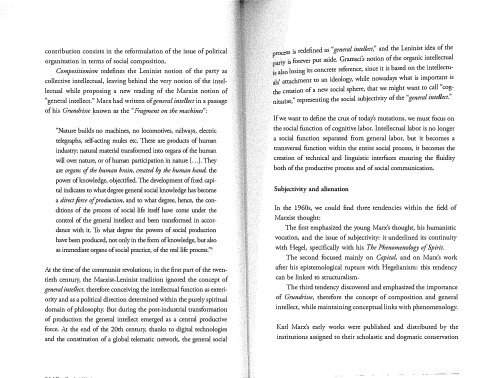Franco ''Bifo'' Berardi - The Soul at Work From Alienation to Autonomy
Franco ''Bifo'' Berardi - The Soul at Work From Alienation to Autonomy
Franco ''Bifo'' Berardi - The Soul at Work From Alienation to Autonomy
- No tags were found...
Create successful ePaper yourself
Turn your PDF publications into a flip-book with our unique Google optimized e-Paper software.
contribution consists in the reformul<strong>at</strong>ion of the issue of politicalorganiz<strong>at</strong>ion in terms of sodal composition.Compositionism redefines the Leninist notion of the party ascollective intellectual, leaving behind the very notion of the intellectualwhile proposing a new reading of the Marxist notion of"general intellect." Marx had written of general intellect in a passageof his Grundrisse known as the "Fragment on the machines":"N<strong>at</strong>ure builds no machines, no locomotives, railways, electrictelegraphs, self-acting mules etc. <strong>The</strong>se are products of humanindustry: n<strong>at</strong>ural m<strong>at</strong>erial transformed in<strong>to</strong> organs of the humanwill over n<strong>at</strong>ure, or of human particip<strong>at</strong>ion in n<strong>at</strong>ure [...). <strong>The</strong>yare organs of the human brain, cre<strong>at</strong>ed by the human hand: thepower of knowledge, objectified. <strong>The</strong> development of fixed capitalindic<strong>at</strong>es <strong>to</strong> wh<strong>at</strong> degree general social knowledge has becomea direct force of production, and <strong>to</strong> wh<strong>at</strong> degree, hence, the conditionsof the process of social life itself have come under thecontrol of the general intellect and been transformed in accordancewith it. To wh<strong>at</strong> degree the powers of social productionhave been produced, not only in the form of knowledge, but alsoas immedi<strong>at</strong>e organs of social practice, of the rcal life process.'"At the time of the communist revolutions, in the first part of the twentiethcentury, the Marxist-Leninist tradition ignored the concept ofgeneral intellect, therefore conceiving the intellectual function as exteriorityand as a political direction determined within the purely spiritualdomain of philosophy. Bur during the post-industrial transform<strong>at</strong>ionof production the general intellect emerged as a central productiveforce. At the end of the 20th century, thanks <strong>to</strong> digital technologiesand the constitution of a global telem<strong>at</strong>ic network, the general socialrocess is redefined as "general intellect," and the Leninist idea of theParry is forever put aside. Grarnsci's notion of the organic intellectualis also losing its concrete reference, since it is based on the intellectuals'<strong>at</strong>tachment <strong>to</strong> an ideology, while nowadays wh<strong>at</strong> is important isthe cre<strong>at</strong>ion of a new social sphere, th<strong>at</strong> we might want <strong>to</strong> call "cognitari<strong>at</strong>,"representing the social subjectivity of the "general intellect."If we want <strong>to</strong> define the crux of <strong>to</strong>day's mut<strong>at</strong>ions, we must focus onthe social function of cognitive labor. Intellectual labor is no longera social function separ<strong>at</strong>ed from general labor, but it becomes <strong>at</strong>ransversal function within the entire social process, it becomes thecre<strong>at</strong>ion of technical and linguistic interfaces ensuring the fluidityboth of the productive process and of social communic<strong>at</strong>ion.Subjectivity and alien<strong>at</strong>ionIn the 1960s, we could find three tendencies within the field ofMarxist thought:<strong>The</strong> first emphasized the young Marx's thought, his humanisticvoc<strong>at</strong>ion, and the issue of subjectivity: it underlined its continuitywith Hegel, specifically with his <strong>The</strong> Phenomenology of Spirit.<strong>The</strong> second focused mainly on Capital, and on Marx's workafter his epistemological rupture with Hegelianism: this tendencycan be linked <strong>to</strong> structuralism.<strong>The</strong> third tendency discovered and emphasized the importanceof Grundrisse, therefore the concept of composition and generalintellect, while maintaining conceptual links with phenomenology.Karl Marx's early works were published and distributed by theinstitutions assigned <strong>to</strong> their scholastic and dogm<strong>at</strong>ic conserv<strong>at</strong>ion






